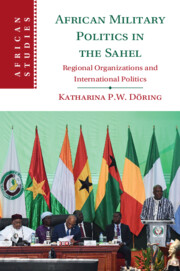Book contents
- African Military Politics in the Sahel
- African Studies Series
- African Military Politics in the Sahel
- Copyright page
- Contents
- Figures
- Tables
- Acknowledgements
- Abbreviations
- Introduction
- 1 Spatial Semantics in African Military Politics
- 2 Combating ‘Sahelistan’
- 3 Challenging the ‘Regions’ of the African Standby Force
- 4 Security and Intelligence Cooperation in the ‘Sahelo-Saharan Region’
- 5 African Military Coalitions and the ‘Core Countries’ in the Sahel
- 6 Towards a Critical Geopolitics of African Military Politics
- Appendix
- Bibliography
- Index
- African Studies Series
4 - Security and Intelligence Cooperation in the ‘Sahelo-Saharan Region’
Published online by Cambridge University Press: 02 November 2023
- African Military Politics in the Sahel
- African Studies Series
- African Military Politics in the Sahel
- Copyright page
- Contents
- Figures
- Tables
- Acknowledgements
- Abbreviations
- Introduction
- 1 Spatial Semantics in African Military Politics
- 2 Combating ‘Sahelistan’
- 3 Challenging the ‘Regions’ of the African Standby Force
- 4 Security and Intelligence Cooperation in the ‘Sahelo-Saharan Region’
- 5 African Military Coalitions and the ‘Core Countries’ in the Sahel
- 6 Towards a Critical Geopolitics of African Military Politics
- Appendix
- Bibliography
- Index
- African Studies Series
Summary
Chapter 4 further explores the role of bureaucrats within the African Union Commission (AUC) and the influence of Algerian representatives on continental security policies. It opens by reconstructing the formation of the Nouakchott Process in 2013 that brought together eleven member states of the ‘Sahelo-Saharan Region’, from Senegal to Chad and Libya to Nigeria, in a political environment marked by long-standing distrust and suspicion that had already hampered previous attempts at security cooperation. Based on this, the chapter analyzes how the spatial semantic ‘Sahelo-Saharan Region’ allowed the initiators of the Nouakchott Process to create a ‘transregional’ space to overcome the spatial dissatisfaction with the African Standby Force (ASF) geography without undermining it. This allowed the AUC and Algerian representatives to regain influence over the conflict interventions in Mali and the Sahel to re-engage where they had felt sidelined after the French intervention and United Nations Mission’s take over. The chapter concludes with an examination of the proposed Nouakchott Process Intervention Force, which, while never deployed, reveals from its conception the growing desire for military-heavy, robust, counterterrorism engagement by African policymakers.
Keywords
- Type
- Chapter
- Information
- African Military Politics in the SahelRegional Organizations and International Politics, pp. 113 - 142Publisher: Cambridge University PressPrint publication year: 2023

